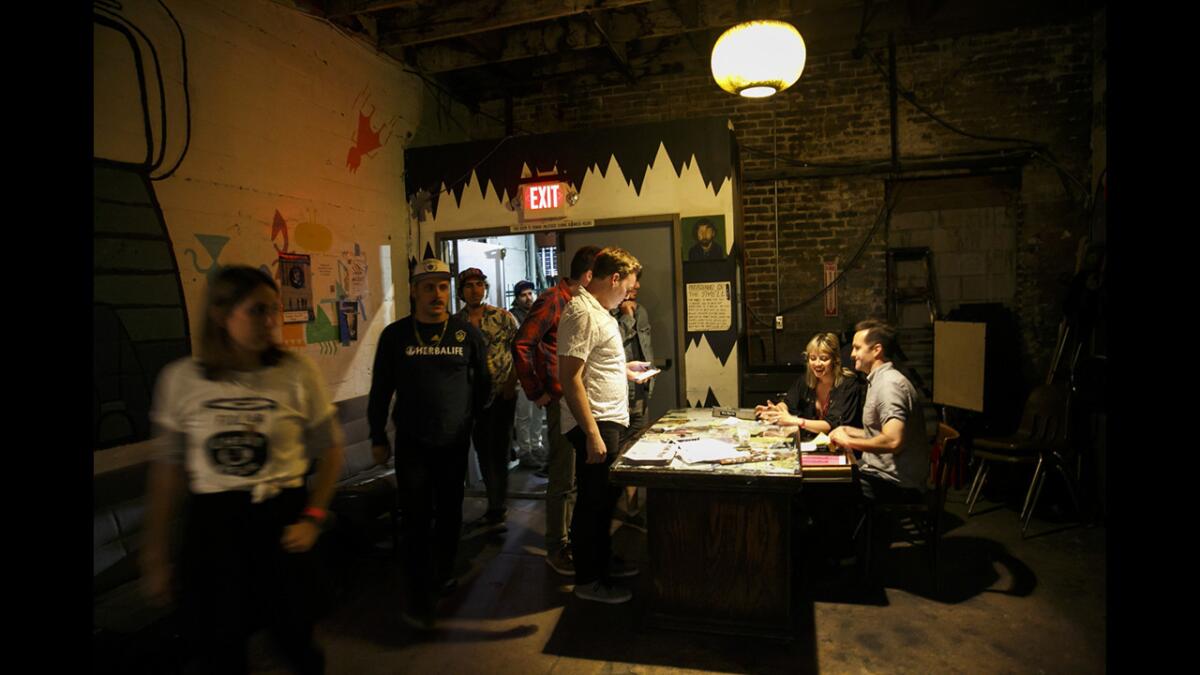After Ghost Ship and a crackdown, L.A.’s DIY music scene plans its response

- Share via
In the two weeks since the Oakland fire that claimed 36 lives at the venue known as Ghost Ship, the crackdown on other DIY (do it yourself) music venues has already begun.
Prominent spaces including Rhinoceropolis in Denver, Bell Foundry in Baltimore and Purple 33 in Los Angeles have been shut down for building code violations or cited as illegal residences. City Atty. Mike Feuer has launched investigations to identify more unapproved venues, with some promises to help evicted tenants.
Struggling to form a unified response to the fallout, some of the most prominent figures in the local underground arts and music scene held a panel Friday at the East Hollywood arts venue Non Plus Ultra to discuss possible strategies.
The talk, “DIY Lives,” featured a varied swath of promoters, venue owners and artists, many of whom are facing the loss of their own venues. Speakers included Jim Smith of the downtown club the Smell, Pauline Lay of the late Echo Park venue Pehrspace, filmmaker Matthew Conboy, whose documentary “Goodnight Brooklyn” followed the life and demise of the New York venue Death by Audio, and Randy Randall of the punk group No Age.
While there was an air of malaise at the gathering about the impending venue crackdown, most of the panelists agreed that change was inevitable. Many admitted they were alarmed by general misconceptions about the DIY scene that have circulated after the Oakland tragedy.
Lay said some media outlets did not understand the DIY culture. Venues that were characterized as dangerous “also felt very safe, like you were around other people who understood what was going on.”
Those in attendance also emphasized the positive aspect of the DIY scene. Many venues like the Smell have led neighborhood rejuvenation, activating underused warehouses and improving blighted areas.
“The more we talk, the more the public will embrace what we do as beneficial to communities,” Smith said. “We have to come out of the underground and get the city and community to help us. We need to not be afraid to reach out to the city and describe what we do and the ways that it’s of value. And if we can make it safer, then we’d do it in a heartbeat.”
Lay agreed: “There are cool people [in government] who understand what these spaces are, and we can seek them out and explain that we want to be safe.”
Many on the panel were also frustrated by media’coverage of the Ghost Ship fire as a “rave” that went badly. That word — a descriptor for a large, unregulated outdoor dance music event — had little to do with the culture or logistics of most DIY venues, they maintained.
Several panelists expressed dismay that the DIY culture was also disparaged on social media, with some users implying that the victims of the Oakland fire, many of whom were LGBT and minorities, deserved their fate.
Though some venues such as Ghost Ship were undeniably unsafe even by DIY standards, panelists like Randall expressed that it was important to get a more accurate depiction out about what goes on in off-the-grid spaces. He viewed semi-legal spaces as fundamentally American, and essential to the intellectual life of young fans.
In his view, Randall said the DIY philosophy encourages “being a freethinking person in charge of your own life. We do it because it’s a form of living.”
Paul McCaffrey, one of the panel’s organizers, recognized that the DIY culture is now facing unprecedented stress and scrutiny in the wake of the Ghost Ship tragedy, and that promoters and artists should seek new ways of communicating.
“It’s important to remember that we don’t need to use the Internet as our only means,” he said. “Before the Internet, these spaces still existed. You don’t have to rely on Facebook to get things done.”
Still, he added, “One of the important things to come from Oakland is that we have to talk about our experiences,” in ways that rebut inaccuracies about DIY culture.
Following the discussion, Conboy’s film, which spliced performance footage from Death By Audio with scenes of Brooklyn changing into a more upscale, straitlaced borough, was screened. In the film’s central irony, the venue was evicted after Vice Media, the $4-billion culture and politics hub and one of DBA’s early champions, took over the building.
The film was made well before the Ghost Ship fire, but attendees at the event speculated that the impending crackdown would negatively affect the ambitious kids that made them thrive in the first place.
“It’s becoming a dystopia for all outsiders,” Randall said. “There’s a lot to be said for us getting loud and getting in people’s faces. I’ve got a sinking feeling it’s only going to get worse, so we just have to go harder and bigger.”
For breaking music news, follow @augustbrown on Twitter.
ALSO:
Oakland’s Ghost Ship fire is nightmare scenario for promoters, governments and music lovers
With the Smell’s future uncertain, L.A.’s music scene could be altered
Ghost Ship fire mystery: What did fire officials know and when did they know it?
More to Read
The biggest entertainment stories
Get our big stories about Hollywood, film, television, music, arts, culture and more right in your inbox as soon as they publish.
You may occasionally receive promotional content from the Los Angeles Times.











